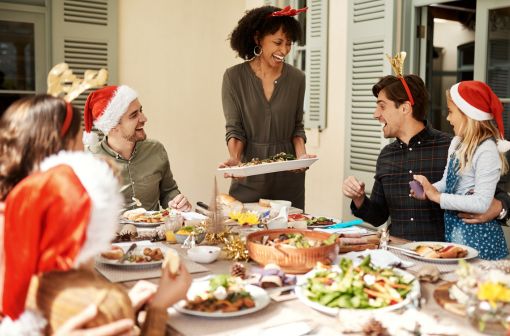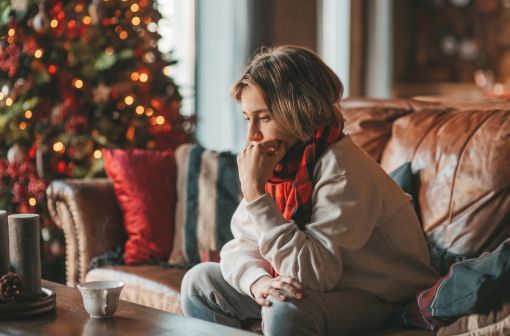“We typically think about elderly people as being lonely—maybe those living in aged care or by themselves at home. We don't usually think about young people like that.”—Dr Kate Lycett, Australian Unity Wellbeing Index lead researcher, Deakin University
Key points
- Australian Unity Wellbeing Index research shows that Australians aged under 35 are experiencing high levels of loneliness.
- There are a number of reasons that may be causing loneliness in young Australians, including life transitions and the spiralling cost of living.
- Christmas can be particularly challenging, due to the perception that “everyone else” is having a wonderful time with friends and family. If you think someone might be lonely, reach out and connect with them.
Loneliness is proven to be bad for your health. A host of studies have shown that social isolation can throw your wellbeing out of balance by raising your risk of high blood pressure, harming your immune system and increasing your threat of early mortality by 25 percent.
“Loneliness is one of the biggest public health issues that we are grappling with at the moment, globally and locally,” admits Dr Barbara Walsh, a Senior Research Fellow at the University of Canberra’s Health Research Institute. “The effect of loneliness has been likened to smoking 15 cigarettes a day and research links it to a whole range of poor health outcomes—mental, physical and psychological.”
Yet the section of society that’s become most susceptible to loneliness may surprise you. Data from 2024 Australian Unity Wellbeing Index research, a 24-year study into the wellbeing of Australians conducted in partnership with Deakin University, revealed that people aged between 18 and 35 reported notably higher levels of loneliness and mental distress than those aged over 55. In fact, the Wellbeing Index data showed that the average loneliness score for someone aged 18 to 24 was 45 percent—almost double the 24 percent average reported for someone aged 75 or older.
“It wasn’t something that we were expecting,” concedes Deakin University’s Dr Kate Lycett, the lead researcher of the Wellbeing Index. “We typically think about elderly people being lonely—maybe those living in aged care or by themselves at home. We don't usually think about young people like that.”

A loneliness epidemic
The Australian Unity Wellbeing Index results are particularly confronting because they counter the assumption that your 20s are meant to be one of the more fun and carefree times of your life. Yet Barbara believes there are a host of contributing factors that could be making this demographic more vulnerable to loneliness.
She points out that this stage of life is often a time of significant transition, where people may be leaving behind their established friendship groups from school or university and potentially moving cities for relationships or work.
The changing ways that we interact online and through social media may also play a part—although Barbara stresses that the jury is still out as to whether the overall effect here is positive or negative. In addition, she cites the impact of the COVID-19 pandemic in changing group behaviours and denying people the opportunity to socialize in person. The spiralling cost of living is another “big issue” as it makes it harder for young people to afford to go out and catch up with friends over a meal or a drink. “So there’s a whole range of reasons as to why loneliness might be impacting younger people.”
As part of an effort to combat this problem, Barbara is working as the Project Lead for the University of Canberra’s Connect Up 2617 pilot program. That number refers to the postcode of the Belconnen and Bruce communities in the Australian Capital Territory, which were specifically chosen due to their demographic compositions, explains Barbara. “Those suburbs have got more than twice the amount of 18- to 30-year-olds as the ACT average.”
The pilot program is trialling sustainable ways for young residents in Belconnen and Bruce to meaningfully connect and develop a stronger sense of community and connection. Working closely with local volunteers and community groups, the scheme delivers a variety of activities to stimulate greater social interaction. These range from free badminton and pizza afternoons to social lunches, barbecues, monthly dinners and group walks.
“We put on activities that were identified in the consultation stage as things that local residents wanted to do,” says Barbara.

Helping the young people in your life
On the back of this ongoing project, Barbara has a number of suggestions on how to engage the younger people in our lives during the holiday season, reduce their sense of isolation and create a sense of balance.
Perhaps the most vital thing to do is to stay aware of the growing prevalence of loneliness among this cohort. Keeping it front of mind can help to encourage you to take up any opportunities to engage with younger people on a day-to-day basis.
“If you notice someone who might be feeling lonely this Christmas or this holiday period, reach out to them,” says Barbara. “Be mindful of the fact that they might be feeling a lack of social connection so might appreciate a conversation or social invitation.”
If you yourself are feeling lonely, consider doing something as simple as having a friendly chat with the barista making your daily coffee or inviting a neighbour over for a cup of tea.
In addition, don’t let yourself be duped by festive clichés—not everyone is swamped by social invitations at this time of year. “I think that over Christmas it’s doubly difficult for people because you have the perception that everyone else is having a really lovely time with family,” says Barbara. “In fact, that’s just not the case. We know that Christmas is a difficult time for lots of people.”
One of the most insidious problems with loneliness is that there's still a lingering stigma around the issue, which causes too many people to suffer in silence. “It’s really interesting because essentially one in three people say that they're lonely,” Barbara points out. “So there shouldn't be any shame for people to say: ‘I'm feeling lonely—I need some social connection.”
The best way to undermine these taboos is to recognise and talk about the issue, and then take meaningful action. By its very nature, loneliness isn’t a problem that one person can solve on their own. “Loneliness is a community issue, not an individual issue,” insists Barbara. “It's not entirely up to you to address your loneliness. We’re all part of the problem and we can all be part of the solution.”
Five loneliness-busting tips

Feeling lonely, or think someone close to you is experiencing loneliness? Here are some strategies to help offset isolation:
- Know that you’re not alone, and that many people want more connection with others. Know that if you smile at your barista or ask them how their day is, they’ll probably smile back and ask you the same.
- Get in touch with a friend—by phone, in person or on social media. Sometimes, having a friendly interaction might be enough to brighten your day.
- Stop scrolling, start strolling. Walk around the city, your local suburb or a park, or do some other physical activity you enjoy. Just being out and about can boost your dopamine levels.
- Seek out volunteer or community activities. The festive season can be a great excuse to foster connection, and giving back to your community can help you feel less alone.
- Talk to someone professionally. If you’re really struggling with loneliness, reach out to an organisation like Beyond Blue, Headspace or Reach Out, which can provide you with strategies and tips to help.
.jpg)

